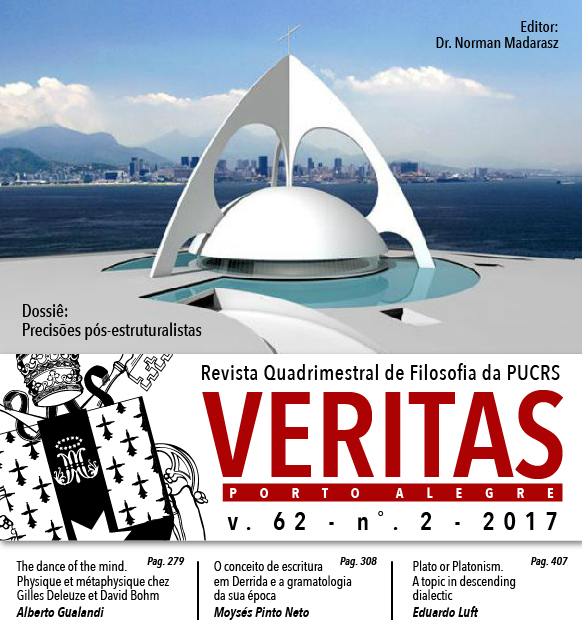(De)Constructing the neoliberal subject with Foucault
DOI:
https://doi.org/10.15448/1984-6746.2017.2.27378Keywords:
Foucault, freedom, neoliberalism, resistance, subjectivity.Abstract
What is the neoliberal subject? Who is s/he? How does s/he become what it is or appears to be? What could it be the transformation of this subject into another? The goal of this article is to answer these questions having Foucault as principal interlocutor. This article has three sections. In the first section, I reconstruct the Foucauldian conceptual horizon in order to characterize the conditions where subjectivity becomes a question. In the second section, I aim at identifying the
elements that allows us to characterize today’s neoliberal subject: a subject that assimilates and incorporates in his own construction the values and ideologies of the market. Finally, I identify the Foucauldian elements that should be kept in order to transform the neoliberal subject into an-Other, trying to imagine what kind of subjectivity can one build today.
Downloads
References
BALL, S. J. “Subjectivity as a site of struggle: refusing neoliberalism?” British Journal of Sociology of Education, London/New York: Routledge, 2015. 10.1080/01425692.2015.1044072 DOI: https://doi.org/10.1080/01425692.2015.1044072
BUTLER, J. Giving an Account of Oneself. New York: Fordham University Press, 2005. DOI: https://doi.org/10.5422/fso/9780823225033.001.0001
COSTA, M. N. Redefining Individuality. Vila Nova Famalicão: Húmus Ed., 2011.
COTOI, C. “Neoliberalism: a Foucauldian Perspective”. International Review of Social Research, 1, 2 (June 2011), p. 109-124. DOI: https://doi.org/10.1515/irsr-2011-0014
DERRIDA, J. Résistances de la psychanalyse. Paris: Éditions Galilée, 1996.
FOUCAULT, M. “The Subject and Power”. Critical Inquiry, 8, 4 (1982), p. 777-795. DOI: https://doi.org/10.1086/448181
______. “O sujeito e o poder”. In: RABINOW, P.; DREYFUS, H. Foucault: uma trajetória filosófica. Rio de Janeiro: Forense Universitária, 1995. p. 231-249.
______. “Why Study Power: The Question of the Subject”. In: DREYFUS, H.; RABINOW, P. (Ed.). Michel Foucault: Beyond Structuralism and Hermeneutics. Chicago: University of Chicago Press, 1983.
______. “What is Enlightenment?” In: RABINOW, P. (Ed.). The Foucault Reader. New York: Pantheon Books, 1984.
______. “Politics and The Study of Discourse”. In: GORDON, C. et al. (Ed.). The Foucault Effect – Studies in Governmentality. Chicago: University of Chicago Press, 1991a. p. 53-72.
______. “Governmentality”. In: GORDON, C. et al. (Eds.). The Foucault Effect – Studies in Governmentality, Chicago: University of Chicago Press, 1991b. p. 87-104.
______. “What is Critique?” In: LOTRINGER, S.; HOCHROTH, L. (Eds.). The Politics of Truth. New York: Semiotext(e), 1997.
______. Birth of Biopolitics: Lectures at the College de France 1978-79. New York: Palgrave Macmillan, 2008.
______. O governo de si e dos outros. São Paulo: Martins Fontes, 2013.
HARVEY, D. A brief history of neoliberalism. Nova York: Oxford University Press, 2011.
HOFMEYR, B. ‘The Culture and Subjectivity of neo-liberal governmentality’. Phronimon, 12, 2 (2011), p. 20-42.
McHOUL, A.; GRACE, W. A Foucault Primer – Discourse, power and the subject, London/New York: Routledge, 1993.
McGUIGAN, J. ‘The Neoliberal Self’. Culture Unbound – Journal of Current Cultural Research, 6 (2014), p. 223-240. DOI: https://doi.org/10.3384/cu.2000.1525.146223
SAFATLE, V.P. 2015. ‘O trabalho do impróprio e os afetos da flexibilização’ em Veritas, Porto Alegre, 60 (jan-abr 2015), p. 12-49. DOI: https://doi.org/10.15448/1984-6746.2015.1.20196
TAYLOR, D., 2013. ‘Resisting the Subject: A Feminist-Foucauldian Approach to Countering Sexual Violence’. Foucault Studies, 16 (set. 2013), p. 88-103. DOI: https://doi.org/10.22439/fs.v0i16.4119
Downloads
Published
How to Cite
Issue
Section
License
Copyright
The submission of originals to Revista Veritas implies the transfer by the authors of the right for publication. Authors retain copyright and grant the journal right of first publication. If the authors wish to include the same data into another publication, they must cite Revista Veritas as the site of original publication.
Creative Commons License
Except where otherwise specified, material published in this journal is licensed under a Creative Commons Attribution 4.0 International license, which allows unrestricted use, distribution and reproduction in any medium, provided the original publication is correctly cited. Copyright: © 2006-2020 EDIPUCRS</p






